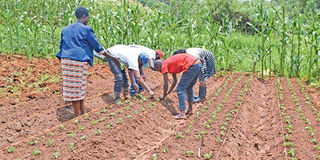Hope for farmers as new potato seeds resistant to nematodes released

Farmers plant potato seedlings for multiplication in a farm in Nandi County in this past photo. Nematodes feed on, and damage the roots of potato crops.
What you need to know:
- Scientists established that the farm and others in the county had highest levels of nematodes infection at 47.6 per cent.
- Prof Danny Coyne, a soil health scientist from the International Institute of Tropical Agriculture, says the new potato seeds are resistant to nematodes and were selected based on additional attributes vis a vis farmer growing preferences in Kenya.
- Harrison Mburu, a scientist at Jomo Kenyatta University of Agriculture and Technology, describes nematodes as minute microscopic worms that feed on and damage the roots of the potato crop.
Jesse Kamutu, a potato farmer in Nyandarua, watched helplessly as his production declined every year.
Production dropped by 50 per cent from 80 bags weighing 110kg, to 40.
The farmer was, however, unaware that what was ailing his firm is potato cyst nematodes (PCN).
Scientists established that the farm and others in the county had highest levels of nematodes infection at 47.6 per cent.
The findings paved way for the introduction of new line of potato seeds that are resistant to nematodes and a new planting technology known as wrap and plant.
Damage the roots
The technology involves wrapping the seeds in protective banana fibre, then planting normally in the soil with manure and fertiliser.
Prof Danny Coyne, a soil health scientist from the International Institute of Tropical Agriculture, says the new potato seeds are resistant to nematodes and were selected based on additional attributes vis a vis farmer growing preferences in Kenya.
“We identified lines that are early maturing, have a short dormancy as Shangi, - the most popular variety grown by farmers, as well as being high-yielding compared to the current local varieties,” said George Ngundo, a plant health inspector at Kephis, who termed the introduction of the new PCN resistant varieties a step in the right direction.
Harrison Mburu, a scientist at Jomo Kenyatta University of Agriculture and Technology, describes nematodes as minute microscopic worms that feed on and damage the roots of the potato crop.





